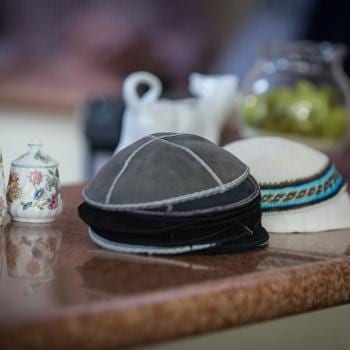The Vision, pp. 180-197
So. Last week the local Walmart was bombed into a shell (ok, ok, technically it was a “Super Center,” but basically it was a Walmart). The bombing was (apparently) a targeted attempt on Cheyenne’s life, for no apparent specific reason. If this terror cell doesn’t like Cheyenne’s parents’ graphic novel Bible business, they could actually bomb that. For the thousandth time, this book makes no sense.
In the week following the bombing, the girls did what girls do when something happens more traumatic than their emotions can handle: they lived in denial. The only only thing Cheyenne would talk about what the babies. The other three girls stared at her off and on during the day with looks of horror.
The babies, remember, are Zulla Mae’s twins, which Cheyenne delivered in the back of her panel truck en route to the hospital after the bombing.
This, by the way, is where the conversation about what it takes to be saved happens. And perhaps this goes to show how very into “show, don’t tell” this book is: while I knew I was skipping ahead to keep the salvation conversation together, I didn’t realize I’d skipped a bombing that was supposed to have left these four young women completely traumatized. That whole scene where Magdalene concluded that the Bible calls Christians to repent not from their sins but from good works feels completely detached from any of this, despite the fact that Debi just told us that the women at the Herb Den are horribly traumatized.
Remember, that conversation left Magdalene jumping for joy in her new spiritual discovery, but also left Cheyenne still worried about about Julie’s faith. We’ll get back to Julie (and the utter nonsense involved there) momentarily.
Technology Is Magic
With that, let’s turn to Asher:
The back room at The Last Publishers’ warehouse was set up for a meeting. Tonight, in just a few minutes, Asher and Omar would be presenting a new concept in missions. It would take this visual presentation to convince the old veteran missionaries that this was truly a better way to reach the world with the gospel. Several of TLP’s team had worked for weeks to make this possible.
Asher stared at, yet didn’t see, the huge liquid crystal display screen mounted on the wall. It had been a gift to the ministry from a businessman. He’d called it second rate, but it was first rate as far as Asher was concerned.
This book is so weird.
Here’s the deal: Malachi Freeman, who is for all practical purposes completely absent from this book, believes he has hit on a magic formula for evangelization. He believes that the solution is: graphic novel Bibles. He believes that publishing translations of the graphic novel Bible he wrote in every language will result in the conversion of the masses, while ordinary missionary work is ineffective.
This ridiculous magical wishful thinking is perhaps illustrated in the scene we are treated to in this section: Malachi invites hundreds of “veteran” missionaries to leave their posts around the world and come to his compound in Tennessee where his a multimedia presentation on a fancy liquid crystal display screen will make all of them throw up their hands and admit that he is right. Then, they will .. what, exactly? Switch from being shoe leather missionaries to running printing presses?
Shook Asher Is Dark Asher
Anyway, Asher may be standing there stroking an LCD screen with a powerpoint ready to go, but he’s also still shook by the bombing.
He reached out, running his finger down the coast of East Asia. His hands still trembled.
The young man shook his head as if to clear the nervousness that had settled over him since the bombing. Trying to still the trembling, he made his hands into fists.
“She didn’t even tell me about the threatening note from the Muslim girl. God, girls can be so dumb sometimes. Lord, help her to learn wisdom and discretion from all this.”
Cheyenne, darkling, run away.
Also, can we stop calling these women girls already? In this section, it is revealed that Julie is 25. And remember, Cheyenne is 22. I feel like I remember Bobbie Jo’s age being given as 27 at some point, though I don’t remember where. In this section, Bobbie Jo is identified as being eight years older than young Ben, who is at least 16, so at the very least Bobbie Jo can’t be younger than 24.
These are grown women, not girls.
Also, Asher has gone default to fists way too many times. I 100% agree with a comment months ago that Asher is written like a white supremacist bomb-maker in the making. His white hot rage against Muslims can almost be felt.
Asher recalled the surprise of the investigators who questioned her after the explosion. The four girls had been warned, and none of them told a single person.
What exactly is the takeaway here, in terms of the narrative arc of this book, or in terms of fleshing out characters, or showing growth? Are we meant to conclude that the women made a serious, serious mistake in withholding information about the note warning they were in danger? If so, has anyone confronted them about it? How did they respond? Have they learned something specific from this that is going to change their actions in the future? Or did they stand firm?
We don’t get any of this. Nothing at all about whether anyone told the women that this was the wrong course of action, nothing about whether the women now think they made a mistake in withholding that information. We only get … this.
He barked a short laugh as he remembered the Yankee saying, “Gee, I thought women couldn’t keep a secret for anything. Four girls and none of them told. A weird bunch of dames.”
Even to his Pacific Northwest ears, his accent sounded like it was from another world. Zulla Mae sounded more normal.
What, is the takeaway that the women are … strange? Particular? Odd? Perfect for menfolk to share a laugh about? Oh, you know, that’s just Cheyenne!
Does Debi know how books work?
Also, Debi is beyond fascinated by accents, and it’s odd.
Asher is still thinking of Cheyenne.
Asher glanced into the adjoining room, hoping to catch a glimpse of her, to hear her girlish laughter. His eyes dropped as the realization hit him. She doesn’t laugh like that anymore.
This is such bullshit. Every single interaction we’ve seen Cheyenne have since the bombing (i.e. the whole conversation about repentance) has been untouched by what she went through. The only thing we’ve been told she’s doing that’s odd is talking about Zulla Mae’s babies nonstop, and given what we’ve been told of Cheyenne (that she wants a husband and babies), that does not seem odd.
This Book Needed Editors
So, let’s go back to Asher, because I want to touch on something about the timeline here that makes no sense:
A tear rolled down Asher’s face, dispersing in the new beard he had started growing the day of the bombing. So close … God, it was so close. Can I bear to lose her?
He walked quickly across the room, trying to outrun his emotions and force his mind to refocus on something else.
This is the closest Debi gets to actually showing that the bombing has affected any of these characters—and frankly, Asher was already worried about Cheyenne’s safety before all this. Remember when he showed up at the Herb Den and took Cheyenne in his arms in a bear hug and started praying over her, acting all weird? That was before the bombing and before he knew about the threatening note.
Frankly, just moving that scene to after those things would’ve made more sense. I mean, look at the timeline here:
- Someone burns a pallet of books in the The Last Publisher’s compound, thus showing the need for more security.
- The women working at the Herb Den receive a note saying they’re in danger, but decide not to tell anyone, including Asher.
- Asher shows up at the Herb Den, bear hugs Cheyenne, prays over her for her safety, and tells her that he and Malachi have decided the Herb Den operations need to be moved to the TLP Compound.
- Cheyenne drives to the local Walmart for unspecified supplies, and narrowly escapes a bombing, of which she is the target.
All you have to do to make this make a lot more sense is switch numbers 3 and 4 above. Seriously, what even is this book.
The Do-Nothing White Supremacists
Asher starts thinking about security.
The Main Street Market, the only gas station in the small hick down, was still owned and operated by a Muslim family. The local townsfolk avoided the place like a plague. Even though the store was open for business, it looked abandoned.
I’m sorry, what?! After that Walmart got blown up, the local white supremacists who supposedly run this town would have run this family out of town.
After 9/11 the international student my family was matched with was scared to leave his apartment, and he wasn’t from a country that had anything to do with it. Here we’re talking a local bombing that killed local people (not a bombing in a city far away), white supremacists in charge of all of the levers of power, and a Muslim immigrant family that was in fact directly involved in the bombing—this Main Street Market would have been burned to the ground. And worse.
Oh and you know what? Two pages later there’s this:
Ben had heard from his geek friend that worked in the county courthouse that the local politicians and White Supremacists were hatching a plan to seize The Last Publishers’ ministry property when circumstances were right. He had learned they were messing with the tax record and zoning codes. Obviously they knew about the expected China deal. Cheyenne’s hands knotted. Bunch of low-class, dumb, brainless bigots.
I literally wrote in the margin, in pen, “none of these people exist in the same universe.” We’re really supposed to believe these white supremacists are hatching all sorts of plans to run The Last Publishers out of town and seize their property, but they don’t give a fig about literal Muslim terrorists living in their town?
It’s as though Debi couldn’t decide whether to have her heroes battle white supremacists or Muslim terrorists, and decided to have them battle both (plus a volcano), but completely forgot that in a consistent universe, these two groups of enemies would also be aware of each other.
The LARPing Extravaganza
We learn through Asher’s musings that the TLP compound now has a huge fence with motion detectors and infrared heat sensors, and an entrance with two gates 100 feet apart with armed guards stationed at it 24/7. Because the deer kept setting off the fence, there’s also a secondary fence around the perimeter to keep the deer from getting near the main fence.
In addition, the local church youth group boys have named themselves “Gideon’s Band” and have erected four deer stands around the perimeter, which they stay in all night wielding night vision goggles and mobile radios.
Meanwhile, Louise has moved all of the employees from her former diner into the TLP compound, where they all live together in a mobile home Malachi moved onto the property. They offered to work for free, but Malachi is magnanimous, so in addition to letting them live on the compound they’re receiving “low wages,” but they’re donating most of that back to the TLP ministry anyway.
Wow. This is starting to feel more and more like a cult. The only thing that’s missing is more talk about guns. The guards at the main gate are armed, but the teens in the deer stands seem to just be LARPing.
We’re told everyone loves Louise, and are treated to a scene where she slaps Bobbie Jo’s hand when Bobbie Jo tries to take a cookie. Bobbie Jo, remember, is the one Debi keeps referring to as the “big girl.” Ha. Ha. She is heavy and she wants to eat cookies, so funny. And by that I mean seriously not cool.
Julie, Mirage Girl
Cheyenne goes into an office to try calling Rob Cohen on the secure line again, and walks in on Julie and Yancey making out in the dark. At least I think they were making out—all we’re told is that “Julie jumped away from Yancey, who was half sitting against the office desk.” We’re not told anything else about what they were doing, except that after Cheyenne flees, Julie walks out “with her head down.”
I don’t think we’re meant to think they were actually having sex. But I’m also not sure if they were actually making out. Julie’s crime appears to be … being alone in a room with Yancey. Which signals her interest. That’s the crime.
Bobbie Jo is in the hallway when Cheyenne comes dashing out of the office, and she also sees Julie, and then Yancey, exit the room.
Bobbie Jo considered Yancey’s better qualities: cute, witty, intelligent … but something about him wasn’t on the mark. I would never even consider him as a mate. She shook her head. But obviously Julie thought him a worthy catch.
The big girl bit the inside of her cheek as she made a quick decision. Julie is 25 years old. She needs the freedom to prove what’s in her soul. It’s not my place to persuade her otherwise.
So in the end, no one says a thing to Julie. But everyone knows what happened, including Louise, who apparently was also nearby at that moment.
Louise leaned over whispering to the young woman, “A girl seeks out her own…”
Bobbie Jo looked back at her with an unspoken question.
“Your soul seeks out what you are, Bobbie Jo,” Louise explained. “the pure of heart is attracted to the pure of heart. The strong woman wants a strong, confident man. So is the case with others…”
Ugh! This is so gross!
Okay, so, Yancey. We met Yancey when he walked into the Herb Den and refused to leave, despite every woman in there strongly hinting that he should. That’s strike one from me–although in theory that could just be lack of awareness in social situations, and I placed more blame on Cheyenne for not telling him directly to leave. Strike two was a heavy implication that he’s spying in some capacity. We don’t really know why he’s in small town Tennessee. He’s clearly up to something—and hiding something—though we’re not told what or why.
Strike three is that Debi literally told us that Yancey fastened on Julie because he correctly identified her as being insecure and thus easy for him to manipulate. So it’s not just that he’s unaware in social situations, it’s that he’s overly aware—he was intentionally playing every single woman in the Herb Den, feeling them out for their weaknesses and figuring out how to best manipulate each.
Poor, poor Julie.
A large part of me wants someone to say something to Julie, to save her from this. The trouble is—what would they say? Even Bobbie Jo isn’t sure why they think Yancey is no good. This is bizarre! At the very least, they should be able to articulate that this match is a bad one because Yancey isn’t strong in his faith—if he has faith at all! He’s not one of their group—not a good Christian. That’s not why I want Julie warned off him, of course, but the fact that no one even raises that with Julie—or tries to get her to think about what she wants in life, what she envisions with him, or anything at all—is just bizarre.
This is not how this would go down in an actual fundamentalist community. So why is Debi writing it like this? Louise and Bobbie Jo conclude that Julie has a character flaw, or else she wouldn’t seek out someone they have all clearly decided is no good. But that’s all they do. And all anyone does!
People in communities like this are not shy of telling young women their marriage choices are shit. So I don’t even know what is going on here.
This book is nuts.
The Extremely Limited Market of Men
Anyway, running into Julie and Yancey like this makes Bobbie Jo start thinking about her own prospects in marriage:
The closest to what she liked in a man was young Ben, but he was eight years younger and five inches shorter.
Girl, I’ve been there. There was a point where I concluded that the guy I liked best in my family’s faith community was a guy five years younger than me. I asked myself whether I could wait, perhaps, for him to grow up. Thankfully, I didn’t try. Instead, I left for college, where there’s a far wider pool of people to meet.
Bobbie Jo should move to the city, get an apartment, get an office job. I bet she’d like getting drinks with friends, sitting in coffee shops, and having a wider pool of cultural institutions to visit. And she’d have no trouble getting dates, given how Debi has described her physical appearance and its affect on men.
Is it odd to anyone else that Bobbie Jo is described as drop-dead gorgeous, but also treated like she has an eating problem? (The thing with the cookies keeps coming up.) I’m not entirely sure what to make of it.
In Which Only Cheyenne and Asher Are Real
And with that, back to Cheyenne! Before trying to put a call through to Rob Cohen in a different office, Cheyenne pauses to watch Asher, who is preparing for the meeting with the missionaries (we’ll get to that!).
Cheyenne unconsciously clasped her hands and looked down. She could feel the fabric of her shirt pulling against the scabs on her elbows. She scraped the slowly healing spots, marveling that she had never even felt the wounds until the day after the bombing.
She leaned into the glass door again, watching Asher. He was different since that day. He had a haunted look, a distant remote sadness that made everyone stop talking when he entered the room. He had never been more focused on the task than now. He slept little, worked late and came in early.
Cheyenne wrapped her arms around her body. Her eyes closed. I am different, too. My girlhood was stolen from me … I am old.
What. Cheyenne’s girlhood was already over before the bombing. She’s 22. She’s lost other things, sure—her sense of safety, say—but that just reads … weirdly.
Look, I’m not going to scrutinize how people deal with trauma as individuals, but I sure as heck am going to scrutinize how Debi writes about people dealing with trauma. Reading through this section feels jarring, because the only people who seem to be affected by the bombing are Cheyenne (and only sporadically) and Asher (and he was already morose anyway). Everyone else is 100% normal.
For instance: Debi could have written it such that Julie has run to Yancey because this bombing has freaked her out, and he offers comfort and stability, and is the only one to actually focus on her. Bobbie Jo could have mused, in thinking about young Ben, that she might not have time to wait for him to grow up, because that bombing shows how dangerous life is right now, and she could die anytime.
But no. We get none of that. We get an extremely affected Cheyenne and Asher, and a perfectly normal everyone else.
Asher wasn’t at the Walmart, and while Bobbie Jo and Julie weren’t either, they’ve both known Cheyenne for far longer than Asher has—they’re her coworkers and best friends. As I said, I don’t want to go scrutinizing someone’s response to trauma—the issue I have here is with Debi’s writing.
I buy that this bombing could have seriously affected Asher, especially if we change the timeline as I suggested, so that it’s the first time he’s thought about Cheyenne actually being in this level of danger. What’s odd is the way Debi is writing Bobbie Jo and Julie. In some sense, Asher’s response stands out as strange only in the stark way it contrasts with Bobbie Jo and Julie.
In moments like these, Bobbie Jo and Julie don’t feel real. They’re not allowed to be respond to circumstances, develop, or change. They’re cut-outs of specific personalities that exist primarily to act as tropes, and not as people. And that’s frustrating, because frankly, they’re actually both very interesting. Or at least they would be, if they were allowed to actually matter.
I have a Patreon! Please support my writing!















